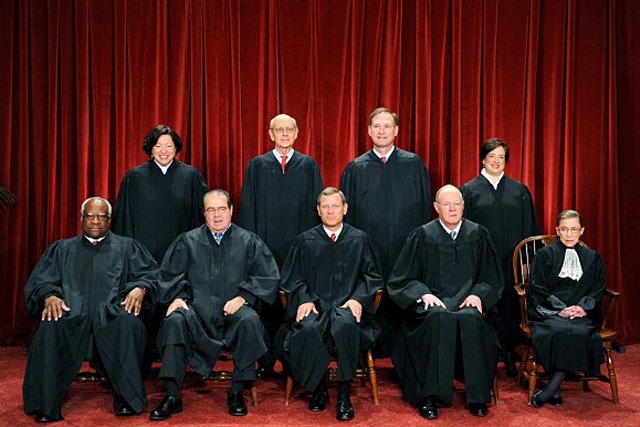
by: Lauren Gailey, Associate Editor
Earlier this month, the United States Supreme Court handed down one of its most anticipated decisions of the October 2013 Term in the campaign finance case of McCutcheon v. Federal Election Commission. The case involved a challenge by Alabama resident Shaun McCutcheon and the Republican National Committee to the aggregate contribution limits imposed by the Federal Election Campaign Act (FECA) and Bipartisan Campaign Reform Act (BCRA).
FECA and BCRA imposed base limits and aggregate limits on the amount of money donors could contribute to candidates for federal office. Base limits restricted the amount of money an individual donor could give to a particular candidate or political committee, while aggregate limits restricted the total amount a donor could give to all of the candidates and committees he or she donated to combined. Specifically, aggregate contributions over a two-year period were capped at $74,600 for non-candidate committees and $48,600 for donations to candidate organizations.
McCutcheon, who The Daily Beast described in October 2013 as “a dedicated Republican,” is the CEO of an electrical engineering firm specializing in mining. During the 2011-2012 election cycle, he made contributions to 16 federal candidates up to the base limits allowed by FECA and BCRA. Although he wanted to contribute to 12 more candidates, the laws’ aggregate limits prevented him from doing so. As McCutcheon sarcastically put it in an editorial he wrote for Politico, “Somehow, I can give the individual limit, now $2,600, to 17 candidates without corrupting the system. But as soon as I give that same amount to an 18th candidate, our democracy is suddenly at risk.” McCutcheon and the Republican National Committee filed a lawsuit challenging those limits as unconstitutional restrictions on donors’ political speech, which is protected by the First Amendment.
In a fractured decision that split the Court along ideological lines, five Justices agreed. The four-Justice plurality held in a 40-page slip opinion that the aggregate contribution limits violated the First Amendment. Writing for himself and Justices Antonin Scalia, Anthony Kennedy, and Samuel Alito, Chief Justice John Roberts explained that aggregate limits do not further any independent governmental objective that the base limits do not already protect. The plurality opinion also explained that aggregate limits “do not . . . in any meaningful way” serve to protect the base limits, and that there are many ways other than through aggregate contribution limits to achieve the government’s stated interest in preventing corruption.
The plurality concluded that caps on aggregate contributions are not in “proportion to the interest served” by campaign finance laws: protecting the electoral process from corruption. Due to the “substantial mismatch between the Government’s stated objective [of preventing corruption] and the means selected to achieve it, the aggregate limits fail[ed]” any of the tests the Court uses in its campaign finance cases. Aggregate contribution limits therefore represented an “unnecessary abridgement” of political speech rights under the First Amendment.
Because it reached this result without having to choose which test to apply, the McCutcheon plurality was able to strike down aggregate contribution limits without having to re-examine the distinction between “contributions” and “expenditures” that the Court drew in 1976’s Buckley v. Valeo. Political expenditures are spent in order to directly advocate for or against a certain candidate. Contributions, on the other hand, are first given to someone else: a candidate or group who then spends this “soft money” on a campaign. Expenditure limits are subject to strict scrutiny because, as the Court explained in Buckley, they “necessarily reduce[] the quantity of expression.” Contribution limits are subject a lower bar—they must be “closely drawn to match a sufficiently important interest.” For this reason, the Buckley Court held that they are generally constitutional. As McCutcheon illustrates, however, this is not always the case.
Justice Clarence Thomas, who concurred in the judgment, agreed with the plurality that the aggregate contribution limits should be struck down but would have gone further. Justice Thomas would have overruled Buckley and rejected the line it drew between contributions and expenditures as a distinction without a meaningful difference. He criticized the plurality for declining to do so even though it “continue[d] to chip away at Buckley’s footings,” leaving “what remains of Buckley . . . a rule without a rationale.”
Justice Stephen Breyer, joined by Justices Ruth Bader Ginsburg, Sonia Sotomayor, and Elena Kagan, dissented. Justice Breyer criticized the plurality for defining the sort of corruption the government hopes to prevent through laws like FECA and BCRA too narrowly, as quid pro quo corruption involving an exchange of favors. In reality, he explained, the “anticorruption interest that drives Congress to regulate campaign contributions is a far broader, more important interest than the plurality acknowledges.” The dissent expressed fear that the absence of limits like those McCutcheon struck down would open the door to more election corruption.
Justice Breyer pondered whether McCutcheon left any room for campaign finance restrictions intended to ensure that politicians cannot be bought and that the political speech of the rich does not drown out everybody else’s. He warned that “[t]aken together with [Citizens United, where the Court struck down BCRA’s restrictions on corporations’ political expenditures], today’s decision eviscerates our [n]ation’s campaign finance laws, leaving a remnant incapable of dealing with the grave problems of democratic legitimacy that those laws were intended to resolve.” McCutcheon, the dissent concluded, “undermines, perhaps devastates, what remains of campaign finance reform.”
Lauren Gailey is a 3L at Duquesne Law and the Supreme Court beat writer for Juris Blog. Over the course of her law school career, she has developed a love for appellate work and constitutional issues, and she hopes to encounter both frequently in her future practice. She is grateful to the editors of Juris for allowing her the opportunity to explore these and many other fascinating subjects in the magazine and blog.
You can read the full opinion of McCutcheon v. FEC below:
